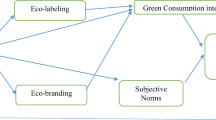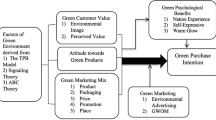Abstract
We draw theoretical support from the concept of customer participation and cognitive dissonance theory to investigate the moderating effects of the preference-related belief of nature-based tourists, that is, the New Environmental Paradigm (NEP), on relationships between tourist experiential components and outcomes. The responses of 500 visitors to the Yangmingshan National Park, Taiwan indicate that actively participative experiences (APEs)—that is, education and escapism—are more positively related than passively participative experiences (PPEs)—that is, entertainment and esthetics—to pleasure and memorability. Furthermore, tourists’ NEP appears to reinforce the effects of APEs and to weaken the effects of PPEs. We also found that tourists’ NEP has a stronger reinforcing effect than a weakening effect. Our study contributes further evidence to current insights into the importance of tourists’ participation in co-creating value of tourist experiences.



Similar content being viewed by others
References
Akyildiz M, Argan M (2010) Factors of leisure experience: a study of Turkish festival participants. Stud Phys Cult Tour 17(4):385–389
Andersson TD (2007) The tourist in the experience economy. Scand J Hosp Tour 7(1):46–58
Auh S, Bell SJ, McLeod CS, Shih E (2007) Co-production and customer loyalty in financial services. J Retail 83(3):359–370
Bandura A (1997) Self-efficacy: the exercise of control. Freeman, New York
Bandura A, Cervone D (1986) Differential engagement of self-reactive influences in cognitive motivation. Organ Behav Hum Dec 38(1):92–113
Bilsky W, Schwartz SH (1994) Values and personality. Eur J Pers 8(3):163–181
Binkhorst E, Den Dekker T (2009) Agenda for co-creation tourism experience research. J Hosp Mark Manag 18(2–3):311–327
Bissing-Olson MJ, Iyer A, Fielding KS, Zacher H (2013) Relationships between daily affect and pro-environmental behavior at work: the moderating role of pro-environmental attitude. J Organ Behav 34(2):156–175
Chan KW, Yim (Bennett) CK, Lam SSK (2010) Is customer participation in value creation a double-edged sword? Evidence from professional financial services across cultures. J Mark 74(3):48–64
Cohen J, Cohen P (1983) Applied multiple regression/correlation analysis for the behavioral sciences, 2nd edn. Lawrence Erlbaum, Hillsdale
Cole ST, Scott D (2004) Examining the mediating role of experience quality in a model of tourist experiences. J Trav Tour Mark 16(1):79–90
Curtin S (2010) Managing the wildlife tourism experience: the importance of tour leaders. Int J Tour Res 12(3):219–236
Daft RL (2011) The leadership experience, 5th edn. Cengage, Mason
Deci EL (1975) Intrinsic motivation. Plenum, New York
Deci EL, Ryan RM (1985) Intrinsic motivation and self-determination in human behavior. Plenum, New York
Dolcos F, Cabeza R (2002) Event-related potentials of emotional memory: encoding pleasant, unpleasant, and neutral pictures. Cognit Affect Behav Neurosci 2(3):252–263
Dorwart CE, Moore RL, Leung Y-F (2010) Visitors’ perceptions of a trail environment and effects on experiences: a model for nature-based recreation experiences. Leis Sci 32(1):33–54
Dunlap RE, Van Liere KD, Mertig AG, Jones RE (2000) Measuring endorsement of the new ecological paradigm: a revised NEP Scale. J Soc Issue 56(3):425–442
Etgar M (2008) A descriptive model of the consumer co-production process. J Acad Mark Sci 36(1):91–108
Fabrigar LR, Petty RE, Smith SM, Crites SL (2006) Understanding knowledge effects on attitude-behavior consistency: the role of relevance, complexity, and amount of knowledge. J Pers Soc Psychol 90(4):556–577
Festinger L (1957) A theory of cognitive dissonance. Row Peterson, Evanston
Gawronski B (2012) Back to the future of dissonance theory: cognitive consistency as a core motive. Soc Cognit 30(6):652–668
Gnoth J (1997) Tourism motivation and expectation formation. Ann Tour Res 24(2):283–304
Gnoth J (2007) The structure of destination brands: leveraging values. Tour Anal 12(5–6):345–358
Hosany S, Witham M (2010) Dimensions of cruisers’ experiences, satisfaction, and intention to recommend. J Trav Res 49(3):351–364
Huang J, Hsu CHC (2010) The impact of customer-to-customer interaction on cruise experience and vacation satisfaction. J Trav Res 49(1):79–92
Iso-Ahola SE (1980) Social psychology of leisure and recreation. Wm. C, Brown
Iso-Ahola SE (1982) Toward a social psychological theory of tourism motivation: a rejoinder. Ann Tour Res 9(2):256–261
Jennings G, Lee YS, Ayling A, Lunny B, Cater C, Ollenburg C (2009) Quality tourism experiences: reviews, reflections, research agendas. J Hosp Mark Manag 18(2–3):294–310
Jolibert A, Baumgartner G (1997) Values, motivations, and personal goals: revisited. Psychol Mark 14(7):675–688
Juan P-J, Chen H-M (2012) Taiwanese cruise tourist behavior during different phases of experience. Int J Tour Res 14(5):485–494
Jurowski C, Uysal M, Williams DR, Noe FP (1995) An examination of preferences and evaluations of visitors based on environmental attitudes: Biscayne Bay National Park. J Sus Tour 3(2):73–86
Kachel U, Jennings G (2010) Exploring tourists’ environmental learning, values and travel experiences in relation to climate change: a postmodern constructivist research agenda. Tour Hosp Res 10(2):130–140
Kahneman D, Tversky A (1984) Choices, values, and frames. Am Psychol 39(4):341–350
Kang M, Gretzel U (2012) Effects of podcast tours on tourist experiences in a national park. Tour Manag 33(2):440–455
Kay PL (2009) Cultural experience tourist motives dimensionality: a cross-cultural study. J Hosp Mark Manag 18(4):329–371
Kim H, Borges MC, Chon J (2006) Impacts of environmental values on tourism motivation: the case of FICA, Brazil. Tour Manag 27(50):957–967
Kruger M, Saayman M (2010) Travel motivation of tourists to Kruger and Tsitsikamma national parks: a comparative study. S Afr J Wildl Res 40(1):93–102
Larsen S (2007) Aspects of a psychology of the tourist experience. Scand J Hosp Tour 7(1):7–18
Lee T-H (2010) Assessing visitors’ experiences at hot spring recreation areas in Taiwan. Int J Tour Res 12(2):193–203
Lee HM (2013) A visitor experience scale: historic sites and museums. Unpublished doctoral dissertation, University of Waterloo, Waterloo
Lee Y-S, Shin W-J (2014) Marketing tradition-bound product through storytelling: a case study of a Japanese sake brewery. Serv Bus. doi:10.1007/s11628-013-0227-5
Lee SM, Olson DL, Trimi S (2012a) Innovative collaboration for value creation. Organ Dyn 41(1):7–12
Lee SM, Olson DL, Trimi S (2012b) Co-innovation: convergenomics, collaboration, and co-creation for organizational values. Manag Decis 50(5):817–831
Maddux JE (1995) Self-Efficacy, adaptation, and adjustment: theory, research, and application. Plenum Press, NY, pp 173–202 (The Plenum Series in Social/Clinical Psychology)
Marinak BA, Gambrell LB (2008) Intrinsic motivation and rewards: what sustains young children’s engagement with text? Lit Res Instr 47(1):9–26
Mehmetoglu M, Engen M (2011) Pine and Gilmore’s concept of experience economy and its dimensions: an empirical examination in tourism. J Qual Assur Hosp Tour 12(4):237–255
Mehmetoglu M, Normann Ø (2013) What influences tourists’ overall holiday experience? Tourism company products versus destination products. Eur J Tour Res 6(2):183–191
Meyer JP, Becker TE, Vandenberghe C (2004) Employee commitment and motivation: a conceptual analysis and integrative model. J Appl Psychol 89(6):991–1007
Mossberg L (2007) A marketing approach to the tourist experience. Scand J Hosp Tour 7(1):59–74
Musa R, Kassim RNM (2012) Factorial structure and psychometric validation of ecotourism experiential value construct: insights from taman negara national park, Malaysia. Int J Econ Bus Eng 6(8):331–338
Oh H, Fiore AM, Jeoung M (2007) Measuring experience economy concepts: tourism applications. J Trav Res 46(2):119–132
Payne AF, Storbaeka K, Erow P (2008) Managing the co-creation of value. J Acad Mark Sci 36(1):83–96
Pine BJ, Gilmore JH (1998) Welcome to experience economy. Harv Bus Rev 74(6):97–105
Pine BJ, Gilmore JH (1999) The experience economy: work is theatre & every business a stage. Harvard Business School Press, MA
Pizam A, Fleischer A (2005) The relationship between cultural characteristics and preference for active vs. passive tourist activities. J Hosp Leis Mark 12(4):5–25
Quadri-Felitti D, Fiore AM (2012) Experience economy constructs as a framework for understanding wine tourism. J Vac Mark 18(1):3–15
Raadik J, Cottrell SP, Fredman P, Ritter P, Newman P (2010) Understanding recreational experience preferences: application at fulufjället national park, Sweden. Scand J Hosp Tour 10(3):231–247
Randall C, Rollins RB (2009) Visitor perceptions of the role of tour guides in natural areas. J Sustain Tour 17(3):357–374
Rayport JF, Sviokla JJ (1994) Managing in the marketspace. Harv Bus Rev 72(6):141–150
Ritchie JR, Hudson S (2009) Understanding and meeting the challenges of consumer/tourist experience research. Int J Tour Res 11(2):111–126
Robbins SP, Judge TA (2011) Organizational behavior, 14th edn. Pearson Education, Upper Saddle River
Ryan RM, Deci EL (2000) Intrinsic and extrinsic motivations: classic definitions and new directions. Contemp Educ Psychol 25(1):54–67
Salerno A (2009) Consumer creative experience: the role of motivational orientation in creative leisure activity. Rech Appl Mark (English edn) 24(1):69–91
Schleicher DJ, Watt JD, Greguras GJ (2004) Reexamining the job satisfaction-performance relationship: the complexity of attitudes. J Appl Psychol 89(1):165–177
Scott N, Laws E, Boksberger P (2009) The marketing of hospitality and leisure experiences. J Hosp Mark Manag 18(2–3):99–110
Sheldon KM, Elliot AJ, Ryan RM, Chirkov V, Kim Y, Wu C, Demir M, Sun Z (2004) Self-concordance and subjective well-being in four cultures. J Cross Cult Psychol 35(2):209–223
Sheng C-W, Chen M-C (2012) A study of experience expectations of museum visitors. Tour Manag 33(1):53–60
Singh T, Slotkin MH, Vamosi AR (2007) Attitude towards ecotourism and environmental advocacy: profiling the dimensions of sustainability. J Vacat Mark 13(2):119–134
Snyder M (1987) Public appearances, private realities: the psychology of self-monitoring. Freeman, New York
Stamboulis Y, Skayannis P (2003) Innovation strategies and technology for experience-based tourism. Tour Manag 24(1):35–43
Steg L, Vlek C (2009) Encouraging pro-environmental behaviour: an integrative review and research agenda. J Environ Psychol 29(3):309–317
Steg L, Bolderdijk JW, Keizer K, Perlaviciute G (2014) An integrated framework for encouraging pro-environmental behaviour: the role of values, situational factors and goals. J Environ Psychol 38(June):104–115
Su C-J (2010) An examination of the usage and impact of upward influence tactics by workers in the hospitality sector of Taiwan: expanding the framework of Rao, Schmidt, and Murray (1995). Can J Adm Sci 27(4):306–319
Su C-J, Yang J-H, Badaoui K, Cho N (2014) Tour leaders’ impression management and job performance: exploring the moderating role of tourists’ self-monitoring. Asia Pac J Tour Res 19(3):356–373
Usunier J-C, Lee JA (2009) Marketing across cultures, 5th edn. Pearson Education Limited, Edinburgh Gate
Vansteenkiste M, Lens W, Deci EL (2006) Intrinsic versus extrinsic goal contents in self-determination theory: another look at the quality of academic motivation. Educ Psychol 41(1):19–31
Veal AJ (1997) Research methods in leisure and tourism. Pitman, London
Venkatesh R, Kohli AK, Zaltman G (1995) Influence strategies in buying centers. J Mark 59(4):71–82
Vespestad MK, Lindberg F (2011) Understanding nature-based tourist experience: an ontological analysis. Curr Issues Tour 14(6):563–580
Vespestad MK, Mehmetoglu M (2010) The relationship between tourist nationality, cultural orientation and nature-based tourism experiences. Eur J Tour Res 3(2):87–104
Volo S (2009) Conceptualizing experience: a tourist based approach. J Hosp Mark Manag 18(2–3):111–126
Waterman AS (1990) Personal expressiveness: philosophical and psychological foundations. J Mind Behav 11(1):47–73
Waterman AS, Schwartz SJ, Conti R (2008) The implications of two conceptions of happiness (hedonic enjoyment and eudaimonia) for the understanding of intrinsic motivation. J Happiness Stud 9(1):41–79
Whitmarsh L, O’Neill S (2010) Green identity, green living? The role of pro-environmental self-identity in determining consistency across diverse pro-environmental behaviours. J Environ Psychol 30(3):305–314
Williams A (2006) Tourism and hospitality marketing: fantasy, feeling and fun. Int J Contemp Hosp Manag 18(6):482–495
Wong J-Y, Lee W-H (2012) Leadership through service: an exploratory study of the leadership styles of tour leaders. Tour Manag 33(5):1112–1121
Wong J-Y, Wang C-H (2009) Emotional labor of the tour leaders: an exploratory study. Tour Manag 30(2):249–259
Yim CK, Chan KW, Lam SSK (2012) Do customers and employees enjoy service participation? Synergistic effects of self- and other-efficacy. J Mark 76(6):121–140
Zhou J (1998) Feedback valance, feedback style, task autonomy, and achievement orientation: interactive effects on creative performance. J Appl Psychol 83(2):261–276
Zhou Y, Zhang Y, Montoro-Sánchez A (2011) Utilitarianism or romanticism: the effect of rewards on employees’ innovative behaviour. Int J Manpow 32(1):81–98
Zografos C, Allcroft D (2007) The environmental values of potential ecotourists: a segmentation study. J Sustain Tour 15(1):44–66
Author information
Authors and Affiliations
Corresponding author
Rights and permissions
About this article
Cite this article
Su, CJ., Lebrun, AM., Bouchet, P. et al. Tourists’ participation and preference-related belief in co-creating value of experience: a nature-based perspective. Serv Bus 10, 823–846 (2016). https://doi.org/10.1007/s11628-015-0292-z
Received:
Accepted:
Published:
Issue Date:
DOI: https://doi.org/10.1007/s11628-015-0292-z




